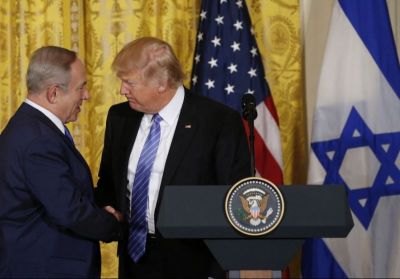Christian Reaction to Trump's Jerusalem Speech: Are We Headed to a Major Reset in Jewish-Christian Relations?

President Trump's recognition of Jerusalem as Israel's capital was met with enthusiasm by most American Jews. Christian reaction to the announcement, however, has been an eye-opener, and might have greater impact upon future Jewish-Christian relations than the President's announcement will ultimately have on the politics of the Middle East.
We would have loved to have heard kudos from all corners of the Christian world, congratulating Jews on the United States' recognition of our unbroken connection and devotion to the ancient city of Jerusalem. Some statements could have declared: "Congratulations on a major milestone in the return of an ancient people to its Land. We celebrate with you. Our joy, however, does not diminish our concerns for peace, for Palestinians, for other religious groups with a stake in the Holy City. We worry about how this step could impact those goals." Many Jews, including the authors of this essay could accept such a message – even where we disagree about the impact.
But that is not what happened.
In the decades following WWII, important groups in Christendom, humbled and guilt-ridden by their recognition of the role that centuries of Church-inspired anti-Semitism played in the run-up to the murder of six million Jews in the Nazi Holocaust, proffered bridge-building and understanding to Jews. Some were friendly to Israel; others were not. All volubly declaimed their search for meaningful relationships.
Relationships, however, require more than photo-ops of smiling clergy. They require genuine feeling for the other, not just cerebral understanding. Imagine that you just got the biggest career boost in your life, and you share it enthusiastically with the person to whom you feel closest. As a wrinkle spreads over his/her brow, all you hear back is, "So you won't be able to prepare dinners for us anymore on Tuesday nights?" Or "I'm feeling very anxious about the candidate that you beat out for the promotion." That would tell you that there was not as much of a relationship at work as you believed. Friends feel for friends. They share the joy and the tragedy, in heart as well as mind.
With some wonderful exceptions, Jews witnessed a complete lack of feeling and empathy from Christians in the last days.
We witnessed a mixed chorus of hand-wringing, the circling of wagons around self-interest, and blatant contempt for Israel's security.
The Pope worried about upsetting the status quo about non-Jewish holy places – as if recognizing the reality that Jerusalem is the administrative capital of Israel could diminish her perfect record in maintaining access to Christian sites, and in many cases, keeping competing Christian groups from violence against each other. This, while in the surrounding Arab countries, Christians are targeted, churches burned, and communities decimated. Congratulations to Jews – especially those who take the Scripture shared by Christians and Jews seriously – on an almost biblical event? Not from the Vatican.
In a letter from the Patriarchs and Heads of Churches in Jerusalem, we read of "hatred, conflict, violence and suffering," but no acknowledgment of Arab incitement, terror attacks, and child suicide bombers. They see the President's declaration as a threat to "the present international status of Jerusalem," while having been silent when PA President Abbas several times called Jerusalem "the eternal capital of the state of Palestine." No problem for them there – and no congratulations to the Jewish people on continuing the work that King David began.
From mainline Protestants, Jews heard, not warm wishes but dire predictions about the needless thwarting of the peace-process, a process that the Palestinians have elected to sit out for many years, and never produced any progress whatsoever towards a negotiated settlement. (If anything, perhaps the corrupt Palestinian leadership, just might be jolted into entering into serious negotiations when they realize that most Arab countries no longer view their cause as a top concern, and the US is no longer prepared to coddle them as they continue the serial denial that Jews are even stakeholders in Jerusalem or anywhere else in the Holy Land.)
However, one group stands apart from all the others: evangelical Christians. They exuded warmth, acceptance, and congratulations. The reaction was quick and unequivocal from people like the Reverends John Hagee, Gordon Robertson, Sammy Rodriguez, Johnnie Moore, Greg Laurie, and others. Despite the irreconcilable theological differences that separate conservative Christians from Jews, many of the latter understand and appreciate the genuine regard that the former have for them. Others in liberal Jewish circles have not been able to get beyond the positions that evangelicals take on a number of critically important social issues.
The bottom line—beyond Evangelical, Christian leaders seem to have forgotten the centrality of Jerusalem to the Jewish people, or they don't care.
Either way, interfaith relations appear to be heading towards a major reset...
Rabbi Abraham Cooper is Associate Dean and Director of Global Social Action. Rabbi Yitzchok Adlerstein is the Simon Wiesenthal Center Director of Interfaith Affairs



























